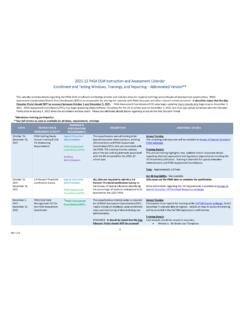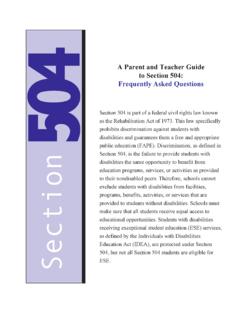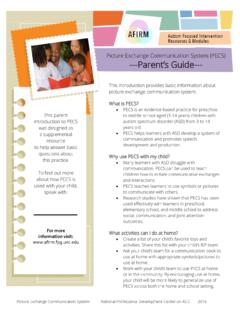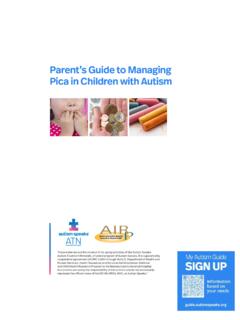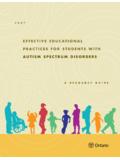Transcription of Pennsylvania Parent Guide to Special Education for School ...
1 Pennsylvania Parent Guide to Special Education for School -Age ChildrenParents are very important participants in the Special Education process. parents know their child better than anyone else and have valuable information to contribute about the kinds of programs and services that are needed for their child s success in School . To ensure the rights of children with a disability, additional laws have been enacted. In this Guide we use the terms rules and regulations. This booklet has been written to explain these rules so parents will feel comfortable and can better participate in the educational decision-making process for their child. The chapters that follow address questions that parents may have about Special Education , relating to their child who is thought to have, or may have, a One focuses on how a child s need for Special Education is determined.
2 In this chapter, the evaluation and decision-making processes are discussed, as well as the members of the team who conduct the tests and make the decisions regarding a child s eligibility for Special Education programs and h apter Two explains how a Special Education program (that is, an Individualized Education Program) is devel-oped and the kinds of information it must include. This chapter describes how appropriate services are deter-mined, as well as the notice that a School district must give to parents summarizing a child s Special Education program. Planning for the transition from School to adult living is also Three deals with the responsibilities that a School district has to a child who is eligible for Special Education services and the child s parents .
3 The School district has specific responsibilities related to confi- dentiality of educational records, quality of materials and classrooms, and discipline Four outlines the options parents have if they disagree with School personnel about their child s edu-cation program. These actions include team meetings with School officials, mediation, resolution sessions, Special Education hearings, and seeking assistance from the Pennsylvania Department of Appendix provides a list of resources where parents can obtain help or have their questions answered. INTRODUCTIONCHAPTER 1 Does my child need Special Education ? .. 1 CHAPTER 2 How is my child s Special Education program determined?
4 6 CHAPTER 3 What are the School s responsibilities to my child and me? .. 12 CHAPTER 4 What if I disagree with the School about my child s Education program or think my child s rights are being denied? .. 18 CONCLUSION .. 22 APPENDIXR esources .. 23 Glossary .. 24 TABLE OF CONTENTS1 Does My Child Need Special Education ?Determining EligibilityAs a Parent , you are uniquely qualified to know your child s learning strengths and weaknesses. If it is determined that your child is eligible for Special Education services, School professionals will utilize your knowledge in designing a Special Education program for your child s benefit. Your child may be eligible for Special Education if your child:1) Has an intellectual disability, emotional disturbance, an orthopedic impairment, a hearing impairment, deafness, a speech or language impairment, a visual impairment (including blindness), autism , traumatic brain injury, other health impairment, a specific learning disability, deaf-blindness, or multiple disabilities and2) Needs Special Education , as determined by an evaluation child must meet both qualifications in order to be eligible for Special Education .
5 In Pennsylvania , all children eligible for Special Education have the right to a free, appropriate, public Education (FAPE).NOTE: Children with disabilities who are not eligible for Special Education may qualify for accommodations in the general classroom under Section 504 of the Rehabilitation Act of 1973. Chapter 15 regulations apply for these students. Chapter 14 regulations apply to those students who qualify for Special Education services by meeting the two-part criteria listed 12 Signs of Physical, Sensory, Intellectual, or Emotional DisabilitySome indications that your child may have a disability that meets the first part of the two-part criteria are: Consistent problems in getting along with others Difficulty communicating Lack of interest or ability in age-appropriate activities Resistance to change Difficulty seeing or hearing that interferes with the ability to communicate Health problems that affect educational performance, including attention problems Difficulty performing tasks that require reading, writing, or mathematics Chronic behavior or social problems that affect your child s ability to learnYour child may need specially-designed instruction to make progress in School .
6 This need for Special Education is the second part of the two-part criteria to be eligible for Special Education child s School has a screening process in place that identifies students who may need Special Education . This process may or may not lead to an initial evaluation for Special Education and should include: A review of the student s records, including attendance and report cards A review of the student s vision and hearing Assessments at reasonable intervals to determine a student s performance based on grade-appropriate standards in core academic subjects A systematic observation of the student s behavior in the classroom or area in which the student is displaying difficultyYou may request an initial evaluation at any time, without going through these screening Evaluation ProcessThe evaluation team gathers the information that will be used to determine if your child needs Special Education and, if so, the types of programs and ser- vices needed.
7 Your child may be evaluated by a School psychologist. Other evaluations may include tests by a hearing specialist for a child with a hearing prob-lem, or an evaluation from a doctor for a child with3a health concern. The evaluation must also include input from a certified professional if certain services, called related services, may be needed. An example is speech therapy (for speech and language) or occupational therapy (for fine motor and other skills).A child may be referred for the first (or initial) evaluation in different ways: You may ask your School to evaluate your child for Special Education at any time. This can be done by sending a letter to the principal of your child s School or by asking a School professional employee.
8 It is recommended that you keep a record of your written or verbal request. A Permission to Evaluate Evaluation Request form should be sent to you within 10 calendar days after the receipt of your The School may contact you to request permis-sion to have your child evaluated. Yo u m u s t consent in writing to your child s evaluation. School officials cannot proceed without your written per-mission. If permission is not received and the School continues to find that an evaluation is necessary, they may ask for a due process hearing to get approval from an impartial hearing officer to evaluate your child. More information about due process hearings is found in Chapter 4 of this give permission for the evaluation process to begin, you must sign the Permission to Evaluate-Consent form given to you by your local educational agency (LEA).
9 The entire evaluation process must be completed within 60 calendar days (not including summer vacation) from the date your permission is received by the LEA. If your child is eligible for Special Education , the ER and a summary must be given to you at least 10 School days before a meeting is held to discuss your child s Individualized Education Program (IEP). A Parent may not feel the 10 days are necessary and must put in writing to the School that the meeting may be held sooner than 10 days. Either way, you will be invited to the types of tests used in the evaluation process depend upon the educational needs of your child. In most cases, your child may be given several tests to help find strengths and needs.
10 Someone other than your child s general classroom teacher may also observe your child in class. Part of the evaluation includes gathering input from parents about their child. Information that you share about your child is very important and must also be included in the the Evaluation Will Tell YouThe evaluation will include information about your child s skills, strengths, and needs. All evaluations and4reevaluations (which are evaluations done at 2- or 3-year intervals after the initial evaluation) must include a review of the testing and assessments that were conducted, infor-mation from the parents , classroom observations, and the observations of teachers and related service evaluation or reevaluation must also tell you what additions or changes are needed to help your child meet the goals in your child s educational program described in your child s Individualized Education Program (IEP), and to take part in and progress in the general curricu-lum (the skills and knowledge taught in a specific LEA).

